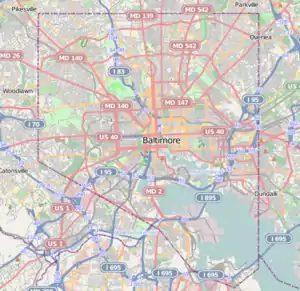| B'nai Israel Synagogue | |
|---|---|
.jpg.webp) B'nai Israel Synagogue, in 2017 | |
| Religion | |
| Affiliation | Modern Orthodox Judaism |
| Ecclesiastical or organizational status | Synagogue |
| Leadership | Rabbi Etan Mintz[1] |
| Status | Active |
| Location | |
| Location | 27 Lloyd Street, Baltimore, Maryland |
| Country | United States |
 Location in Baltimore | |
| Geographic coordinates | 39°17′24″N 76°36′04″W / 39.290°N 76.601°W |
| Architecture | |
| Type | Synagogue |
| Style | Moorish Revival[2] |
| Date established | 1873 (as a congregation) |
| Completed | 1876[3] |
| Website | |
| jewishdowntown | |
B'nai Israel Synagogue | |
| BCL No. | 43 |
| Designated BCL | 1977 |
B'nai Israel Synagogue is a Modern Orthodox synagogue located in the historic Jonestown neighborhood, near downtown and the Inner Harbor of Baltimore, Maryland, in the United States. The synagogue is one of the oldest synagogue buildings in the United States.[4]
The spiritual leader of B'nai Israel Synagogue is Rabbi Etan Mintz.[1]
The synagogue building was listed as a Baltimore City Landmark in 1977.[5]
Architecture
The synagogue is noted for its Moorish Revival architecture. The Aron Kodesh is an architectural fantasy in carved wood, with the cabinet in which the Torah scrolls are stored, surrounded by a pair of tall minarets.
History
A group of members of Baltimore Hebrew Congregation believed that the congregation had become too liberal and modernistic. In 1873[6] they formed a new congregation, Chizuk Amuno.
Members of a Russian speaking congregation made of immigrants from the pale of settlement broke off from a Polish speaking congregation. The "Ruschie Shul" would practice wherever they could: people's houses, the upper levels of grocery stores. In the years between 1880 and 1910, hundreds of thousands of Jews came from the Pale of Settlement, and the longstanding German Jews moved to North West Baltimore.
The building itself was built by Chizuk Amuno Congregation in 1876.[7] Chizuk Amuno Congregation sold the building to B'nai Israel for $12,000 in 1895 when it moved to Northwest Baltimore.[8][9][10]
In 1973, the congregation began raising funds for the restoration of the synagogue.[3]
B'nai Israel donated land to the City of Baltimore to build a park near the synagogue in 1975.[11][12] Named Freedom Park, the park honors victims of oppression.[13]
References
- 1 2 "Our Rabbi". B'nai Israel Synagogue. n.d. Retrieved November 11, 2016.
- ↑ "Architecture". B'nai Israel Synagogue. n.d. Retrieved November 11, 2016.
- 1 2 Peitila, Antero (September 26, 1973). "Jewish New Year 5734: Ram's horn heralds Rosh Hashana". The Baltimore Sun. p. C28.
- ↑ Gordon, Mark W. (1996). "Rediscovering Jewish Infrastructure: Update on United States Nineteenth Century Synagogues". American Jewish History (2019 article update ed.). 84 (1): p=11–27.
- ↑ Commission for Historical & Architectural Preservation (15 November 2015). "The Importance Of Baltimore City Landmarks". City of Baltimore. Retrieved March 13, 2022.
- ↑ "B'nai Israel Congregation Marks 75th Anniversary". The Baltimore Sun. May 24, 1948. p. 8.
- ↑ "B'nai Israel Synagogue". Jewish Museum of Maryland. Archived from the original on 2013-09-29.
- ↑ "Real Estate Transactions". The Baltimore Sun. September 6, 1895. p. 7.
- ↑ Shoken, Fred. "A History of the B'nai Israel Congregation of Baltimore City". Archived from the original on 2014-02-21. Retrieved July 28, 2013.
- ↑ "A Temple of Granite: To Be Erected by the Chizzuh Amuno Congregation". The Baltimore Sun. April 12, 1895. p. 8.
- ↑ "Corned-beef renovation". The Baltimore Sun. January 30, 1975. p. C3.
- ↑ Kimelman, Donald (April 3, 1976). "Mayor kicks off Lombard renewal". The Baltimore Sun. p. B1.
- ↑ Arnett, Earl (August 27, 1976). "Freedom Park will honor all victims of oppression". The Baltimore Sun. p. B1.
External links
![]() Media related to B'nai Israel Synagogue, Baltimore at Wikimedia Commons
Media related to B'nai Israel Synagogue, Baltimore at Wikimedia Commons

